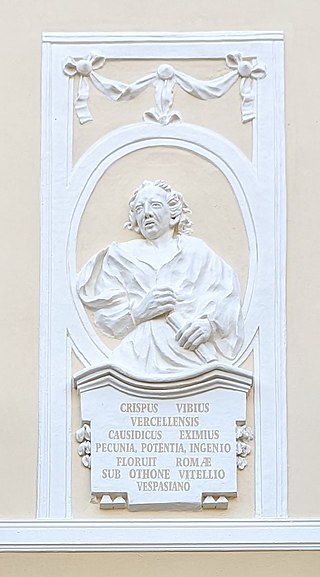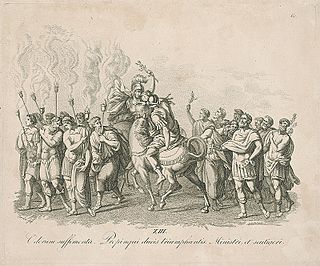Related Research Articles
Gaius Julius Cornutus Tertullus was a Roman senator who was active during the late 1st and early 2nd centuries. He is best known as the older friend of Pliny the Younger, with whom Cornutus was suffect consul for the nundinium of September to October 100.

Lucius Junius Quintus Vibius Crispus was a Roman senator and amicus or companion of the Emperors, known for his wit. He was a three-time suffect consul.
Gaius Avidius Nigrinus was a Roman senator who lived between the 1st and 2nd centuries. Nigrinus served as suffect consul for the nundinium of April to June 110 with Tiberius Julius Aquila Polemaeanus as his colleague.
Sextus Vettulenus Cerialis was a Roman senator and military commander, the 1st legate of Judaea. He was an early supporter of Vespasian, who appointed Cerialis suffect consul in either 72 or 73.
Lucius Tettius Julianus was a Roman general who held a number of imperial appointments during the Flavian dynasty. He was suffect consul for the nundinium of May–June 83 with Terentius Strabo Erucius Homullus as his colleague.
Marcus Cornelius Nigrinus Curiatius Maternus was a Roman senator and general during the reign of Domitian. He was suffect consul during the nundinium of September to October AD 83 with Lucius Calventius Sextus Carminius Vetus. Although some experts consider him a rival with Trajan as heir apparent to the emperor Nerva, he is primarily known from inscriptions.
Titus Junius Montanus was a Roman of the first century and suffect consul in AD 81 with Lucius Julius Vettius Paullus as his colleague. An inscription found in Alexandria Troas indicates that was his hometown, making Montanus the first person from the Greek portion of the Roman Empire admitted to the Roman senate.
Lucius Venuleius Montanus Apronianus was a Roman senator of the first century. He was suffect consul for the nundinium of January to April AD 92 with Qunintus Volusius Saturninus, replacing the emperor Domitian.
Aulus Bucius Lappius Maximus was a Roman senator who flourished during the Flavian dynasty; Brian W. Jones considers him one of Domitian's amici or advisors. He held the consulate twice.

Quintus Julius Cordinus Gaius Rutilius Gallicus was a Roman senator who held several posts in the emperor's service. He was twice suffect consul: for the first time in the nundinium of September to October 70 AD; and the second time in 85 with Lucius Valerius Catullus Messalinus as his colleague, succeeding the Emperor Domitian.
Lucius Julius Marinus Caecilius Simplex was a Roman senator who held several posts in the emperor's service. Simplex was then appointed suffect consul in late 101, with Lucius Arruntius Stella as his colleague. His career is primarily known through inscriptions.
Gaius Calpetanus Rantius Quirinalis Valerius Festus was a Roman senator, general, and amicus to each of the Flavian emperors. He proved his value to the Flavians when, as legatus legionis, or commander, of Legio III Augusta stationed in Africa, he assassinated the proconsul, who favored a rival of Vespasian during the Year of Four Emperors. He maintained his loyalty through the reigns of his sons Titus and Domitian, but fell out of favor during the latter's reign and was forced to commit suicide.
Galeo Tettienus Severus Marcus Eppuleius Proculus Tiberius Caepio Hispo was a Roman senator active in the late 1st and early 2nd centuries AD, who occupied a number of offices in the imperial service. He was suffect consul around the year 101 as the colleague of Rubrius Gallus.
Lucius Herennius Saturninus was a Roman senator active during the reign of Domitian and Trajan. He was suffect consul for the nundinium of May to June AD 100, with Pomponius Mamilianus as his colleague.

Quintus Pomponius Rufus was a Roman senator active in the imperial service; he was governor during the reigns of the emperors Domitian and Trajan. Rufus was also suffect consul for the nundinium September-December AD 95 as the colleague of Lucius Baebius Tullus. Pomponius Rufus is known primarily from inscriptions.
Aulus Marius Celsus was a Roman senator who held several offices in the emperor's service during the first century AD, as well as playing a role in the Year of Four Emperors. He was suffect consul of the nundinium of July to August 69 as the colleague of Gnaeus Arrius Antoninus.

Lucius Valerius Propinquus was a Roman senator active in the second century AD. He was suffect consul who replaced the ordinary consul Marcus Annius Verus and was the colleague of the other ordinary consul, Gaius Eggius Ambibulus, for the remainder of the first nundinium of 126.
(Lucius?) Plotius Pegasus was a Roman senator and jurisconsult active under the Flavian dynasty. He was suffect consul in an uncertain year, most likely 72 or 73, as the colleague of Lucius Cornelius Pusio Annius Messalla. Shortly after his ascension to the imperial throne, Domitian appointed Pegasus urban prefect, one of the most prestigious offices in a senatorial career.

Titus Atilius Rufus was a Roman senator, who held several appointments during the reigns of Nero, Vespasian and Domitian. He was suffect consul in some nundinium prior to the year 80. He is known primarily from inscriptions.
Gaius Minicius Italus was a Roman eques who flourished during the reign of the emperors Vespasian, Domitian, and Trajan. He was appointed to a series of imperial offices, both military and civil, culminating with praefectus or governor of Roman Egypt.
References
- ↑ Paul Gallivan, "The Fasti for A. D. 70-96", Classical Quarterly , 31 (1981), pp. 210, 219
- ↑ Brian W. Jones, The Emperor Domitian (London: Routledge, 1992), p. 11
- ↑ Syme, "Antonine Relatives: Ceionii and Vettuleni", Athenaeum, 35 (1957), p. 313 n. 1; CIL X, 4862
- ↑ Werner Eck, "Jahres- und Provinzialfasten der senatorischen Statthalter von 69/70 bis 138/139", Chiron, 12 (1982), pp. 305-308
- ↑ Eck, "Jahres- und Provinzialfasten", p. 314
- ↑ Brian W. Jones, "C. Vettulenus Civica Cerialis and the False Nero of AD 88", Athenaeum, 61 (1983), pp. 516-521.
- ↑ Suetonius, De vita Caesarum , "Domitian", 10